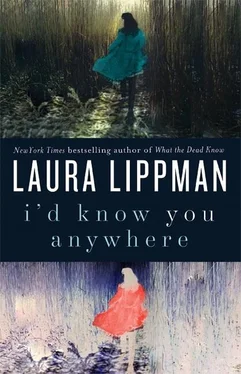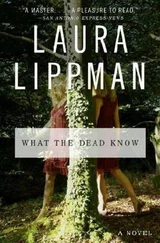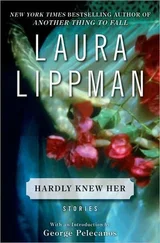“Helpful if I were writing about the Walter Bowman case, but I’m not. I devote my time to cold cases now.”
“There are those who think they can link various cold cases to Walter Bowman.”
“Yes, and I’m one of them. But unless Walter wants to give an interview before his execution—?”
She took a bite of her roasted corn quesadilla, sipped her tea. “Well, he might. Walter’s talking a lot these days.”
“To other journalists?”
She forced herself not to smile at Garrett’s sense of himself as a journalist. He was an accountant for the state of Pennsylvania, and he hadn’t published a book for at least fifteen years. Nothing he had written was even in print.
“No, not other journalists.” She lowered her voice. “To her . Elizabeth Lerner.”
His shock was gratifying. “Why?”
She gave a mystified shrug. “He doesn’t tell me everything. I just know he added her to his call list and they’ve been speaking regularly.”
“I always thought—I said —that things between them were much more complicated than anyone wanted to admit. People criticized me, but she did have multiple chances to escape.”
Barbara almost felt bad. Engaging Jared Garrett’s sordid imagination was like teasing an animal or a small child. Too easy to be fair. And she honestly didn’t want to cause the woman pain, but she was their only hope. To save a life, to prevent a terrible miscarriage of justice—why, anything was permissible. Elizabeth Lerner had nothing to be ashamed of. Unless she let Walter die, and then she was a killer, more cold-blooded than any death row inmate.
“And you know where she lives, her phone number? Do you think she would talk to me?”
“No,” Barbara said, relieved to be back in her usual world of blunt, tactless candor. “I mean, Walter has her phone number, but that doesn’t mean I do.” Another white lie. “Besides, I don’t think she would talk to you now, because she’s still keen that no one know her whereabouts, her past. Perhaps if Walter goes, however—”
“If? I didn’t think there was much doubt.”
“I think it’s important to leave the mind open to possibility. Certainly, there’s no harm in hoping.”
“Elizabeth Lerner.” He shook his head as if he had seen a celebrity, albeit one he didn’t particularly admire. “Her parents threatened a libel suit against me. They even talked about an injunction.”
“They were her parents,” Barbara said. “Of course they felt protective of her.”
“Do you have kids?”
“No,” Barbara said. “I never married, not that I needed a husband to have children. But I don’t like children much.”
“Weren’t you a teacher? I mean, I know you had a horrible run-in with one student, but before that, did you like them?”
“I don’t remember, but—no, I don’t think so. I liked my subjects, government and history. I thought they were important, and I wanted to share them with others. But I wasn’t drawn to teaching because of a blanket love for children. I accepted children as a necessary condition. You?”
“Me? I never was a teacher.”
“Do you have children?”
“No. My wife and I—it didn’t happen for us, and we accepted that. God’s will, and all.”
“You didn’t want to adopt?”
He lowered his voice, although there was no one in the restaurant to hear them. “No, never. You do what I do, you learn some things.”
“What do you mean?”
“About adoption. In crime. Those kids are damaged.”
“Oh, that’s ridiculous. There’s no empirical data to support that. Death row is full of men who were raised by their biological parents. Biological parents who beat them or mistreated them, in most cases. Some of the men I’ve met would have been better off if they had been adopted.”
“You think having bum parents is a reason not to execute someone?”
“Yes, in fact, I do. But then, I don’t think there’s anything that supports the state’s right to murder. Killing is wrong or it isn’t. If it’s wrong for an individual to take someone’s life, it’s wrong for the state. The state doesn’t steal from thieves—”
“It seizes money. It exacts fines.”
“That’s not the same thing. The state doesn’t sexually assault rapists. Why is it only with homicide, and only a particular type of homicide, that we insist on this kind of justice?”
“Walter Bowman did some pretty horrible things.”
“Yes, he did. He’d be the first person to tell you that. And he accepts that a lifetime in prison, with no chance for parole, is fair.”
Jared had abandoned the chili and was picking at the corn bread that accompanied it.
“Look, I can’t promise anything,” Barbara said. “But there’s a possibility that Walter will give you an interview. Walter and Elizabeth. But you have to be patient.”
“How do I know you can deliver either one of them? Why should I believe that you even know where Elizabeth Lerner is?”
“I’ll show you after lunch.”
“SO WHAT HAVE YOU BEENup to?” Walter asked Eliza. It was a natural question. So natural it seemed even more unnatural.
She found herself tempted to tell him about their perfect Sunday. Of course, she would not. She would not speak of her children to Walter, ever, and, so far, he had the good sense not to inquire about them. Besides, it would have been insensitive to prattle on about her happiness, cruel and taunting. That, of course, was part of the appeal. It would have been a way of saying, indirectly: I am where I am, I have what I have, because I am a good person at heart. You are where you are because you’re bad. Just because I was dragged into your life for almost forty days doesn’t make me bad, too.
But the more pressing need was to have the conversation with someone, anyone. She had tried to engage Peter on the topic, but satisfactory husband that he was, he was a man and not one inclined to wax poetic about a day of cupcakes and movies. Vonnie had no patience for such conversations, and Eliza’s own mother often ended up talking about how difficult Vonnie was when Eliza spoke of her trials with Iso. As for friends—she had yet to make any. People were friendly, but they seemed to think she was reserved. Funny, because Eliza had been considered ebulliently capital A American during her London years, and now her countrymen—countrywomen?—seemed to find her cool, detached. Or perhaps she had yet to make friends because most of the parents she met were in Iso’s peer group, where Eliza was probably known as the mother of the subtle bully. Maybe, in retrospect, she should have overlooked Iso’s lie about the mall if only to form an alliance with that friendly-seeming mother.
And here was Walter, someone who knew her in a way that almost no one did. With the exception of her parents and Vonnie, there was no one left in her life who had ever called her Elizabeth. She remembered being sixteen, filling out the papers for her new school. “Why can’t I change my name?” she had asked her parents. “Legally?” her father asked. “I suppose it could be done.” “No, I mean, just change it, call myself something else.” “Bureaucracies are bureaucracies,” her mother said. “Your name has to match the name on your birth certificate or they won’t enroll you.” “But I could shorten it, say it’s something else, or use my middle name.” “Of course you can,” her mother said.
Her full name was Elizabeth Hortense Lerner, after her maternal grandmother. Elizabeth Hortense Babington had lived on Baltimore’s North Side, walking distance from the Quaker meetinghouse she attended. But then—she walked everywhere and didn’t even own a car, relying on cabs for journeys that could not be made on foot. If she had been someone else’s grandmother, Elizabeth and Vonnie probably would have considered her queer, this thin, black-clad woman with long, woolly hair, out of time and out of place as she marched through the city’s streets. Elizabeth had always been proud to carry her name, Vonnie a little bitter that she had been named for their father’s mother, Yvonne Estelle. It was awful to cut down her grandmother’s elegant name, almost like cutting up a wedding dress for bedding. But it presented so many possibilities: Liz, Lizzie, Beth, Betsy, Bette, Bets…Eliza! It retained more of her real name than any other version yet sounded different enough that it was plausible no one would put it together. It was Uh-liz-a-beth Lerner who had been kidnapped a county over. E-Li-Za Lerner was the new girl.
Читать дальше












